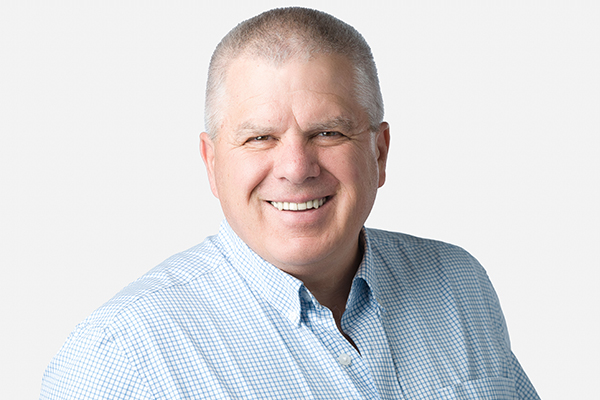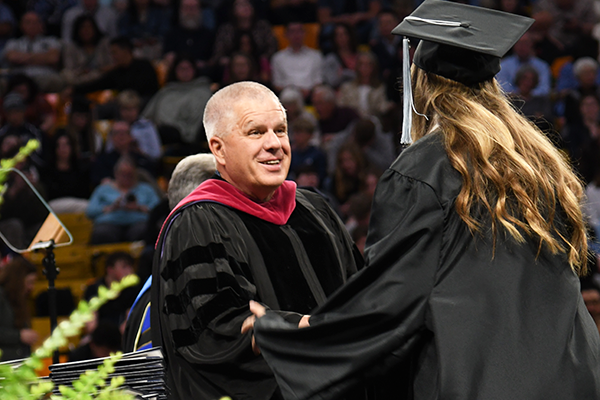Scot Allgood, Professor and Department Head of HDFS, Honored for His Legacy of Service

HDFS Department Head Scot Allgood
Scot Allgood, department head and professor of Human Development and Family Studies (HDFS) in the Emma Eccles Jones College of Education and Human Services (CEHS), has recently announced his retirement from Utah State University. Allgood has been a marriage and family therapy professor at Utah State for the past 32 years and has served as department head of HDFS for the past 14 years.
“I am deeply grateful for Dr. Allgood’s leadership, his support of our team of department heads and me, and his student-centered orientation to everything he does,” says CEHS Endowed Dean Al Smith. “When addressing sticky matters, his counseling training shines through, and he seeks common ground. On the good stuff, he shows genuine appreciation for the efforts of others and joy in their success.”
Allgood came to USU for the first time as a fifteen-year-old farmhand from Morgan, Utah. “My first experience at Utah State came because of the dairy farm where I worked,” he recalls. “The farmer had a calf valued at $25,000. His mother was the highest producing Jersey cow on record in the state and his father was the top bull in the nation, so the calf was highly sought after. But all the calves in the valley were dying and there was nothing the farmers could do to save them. We drove up to USU in our working clothes and boots, carrying this dead calf through the halls of the Veterinary Science building to the lab so they could figure out what was killing them. It was so bizarre. All these students were looking at me like, ‘What is wrong with you?’ I thought, ‘I am never coming back to Utah State!’”
Eighteen years later, in 1991, Allgood was honored to return to the Logan campus, this time as the newest assistant professor in the Department of Human Development and Family Studies. The first person in his family to enroll in a university, Allgood earned a bachelor’s degree from Weber State (1983) in family relations, a master’s degree in home economics with a specialty in marriage and family therapy from Montana State University (1985), and a doctoral degree in marriage and family therapy from Brigham Young University (1988). He also had several years of clinical therapy work under his belt.
The desire to serve others has been a guiding force for Allgood and his career accomplishments reflect that standard. “My parents were always helping people, and my grandparents were the same. So I just grew up liking to be around people and helping out.”
Over his 32-year career at Utah State, Allgood has taught more than 25,000 students in his classes. Troy Beckert, professor and associate department head of Human Development and Family Studies, said, “Dr. Allgood has done such amazing work at Utah State University. His genuine care for the student body at Utah State University will define his legacy.”
A master teacher wherever he goes, Allgood makes his lessons applicable to the learner so they hit home. “You have to look at subtle cues to know what your opponent is going to do,” Allgood recently told a jujitsu competitor whom he met in an airport when the athlete inquired how he might trust his girlfriend’s loyalty. “How can you use that same observation skill in looking at your relationship?”
Allgood’s connection to the field of marriage and family therapy since the 1980s, when MFT was in its infancy in the western United States, has been instrumental in the program’s development at USU. “I’m old enough that I’ve personally met the pioneers in the field of family therapy. With my background I’ve been able to tell the students, ‘This is what they were thinking. This is what they were trying to do with this particular therapy approach.’”
Based on his clinical work, Allgood would advise students, “Always trust yourself to ask hard questions. You know people well enough, and you’ve learned to listen for the cues. You’ll find that you ask your clients questions that you have no idea where they come from.” Utah State’s marriage and family therapy program is now among the top in the nation.
Throughout Allgood’s career, he maintained a rigorous teaching schedule, served on local and academic boards, currently serves as HDFS department chair, and, until four years ago, counseled with ten or more clients weekly in private practice. In 2022, he received a lifetime achievement award from the Utah Association for Marriage and Family Therapists, an association for which Allgood also served on the board of directors three times and as president for three years. He is also a founding partner in the Family Institute of Northern Utah, an organization focused on serving domestic violence victims in Northern Utah.

Allgood congratulates a graduating senior at the recent CEHS convocation ceremony.
In his clinical practice, Allgood focused his expertise primarily on helping couples who were dealing with the devastating impact of infidelity in their marriages. “It’s not for the faint of heart,” Allgood admits. “The emotions are raw, and people are so hurt and angry. But I saw how people were able to put their lives back together and, in a good majority of the cases, how they put their marriages back together.”
Allgood has been instrumental in creating programs—both on and off campus—to serve those most in need. The Aggie First Scholars program, founded in 2016, is a brainchild of Allgood.
“In a chance conversation, a faculty member was telling me about a bright young student who was working so much she didn’t have time to study,” Allgood recalls. “She was working 85 hours a week supporting herself and her family in Ogden. I thought I could do something about it.”
Working through HDFS and leveraging available scholarship money, Allgood helped the student receive the help she needed so she could thrive in her education. Later, Allgood’s intervention was discussed in a university retention workshop and the provost’s office took the lead. Today, the Aggie First Scholars program is designed to assist first-generation college students with scholarship funds and academic support.
Similarly, with a former student-turned-colleague, Allgood helped developed a program that empowers prison inmates to recognize the negative impact their actions have on people. The program, which incorporates faith, morality, and cognitive therapy, is used in Prison Ministry, an organization of Southern Baptist ministers who are focused on helping inmates recognize their misconstrued beliefs of indebtedness and entitlement.
“It’s been really effective,” says Allgood. “The inmates realize, ‘I really screwed up a lot of people’s lives. They don’t owe me, I owe them. And I need to fix my life so I can repay the debts that I’ve incurred.’” Inmates who go through the program have a lower recidivism rate, dropping from 66 percent who reoffend to 18 percent.
Allgood has come a long way since his embarrassing foray in the Veterinary Sciences building hauling a dead calf through the halls. But he’s still the same guy at heart—offering guidance when needed and seeking ways to be of service to those most in need.
Dean Smith agrees. “It has been an absolute privilege to work with Scot. I will miss his daily wisdom and reliable counsel.”
Advice for others? “People recognize when you care,” says Allgood. “I think we have a responsibility to reach out, to be kinder.”

